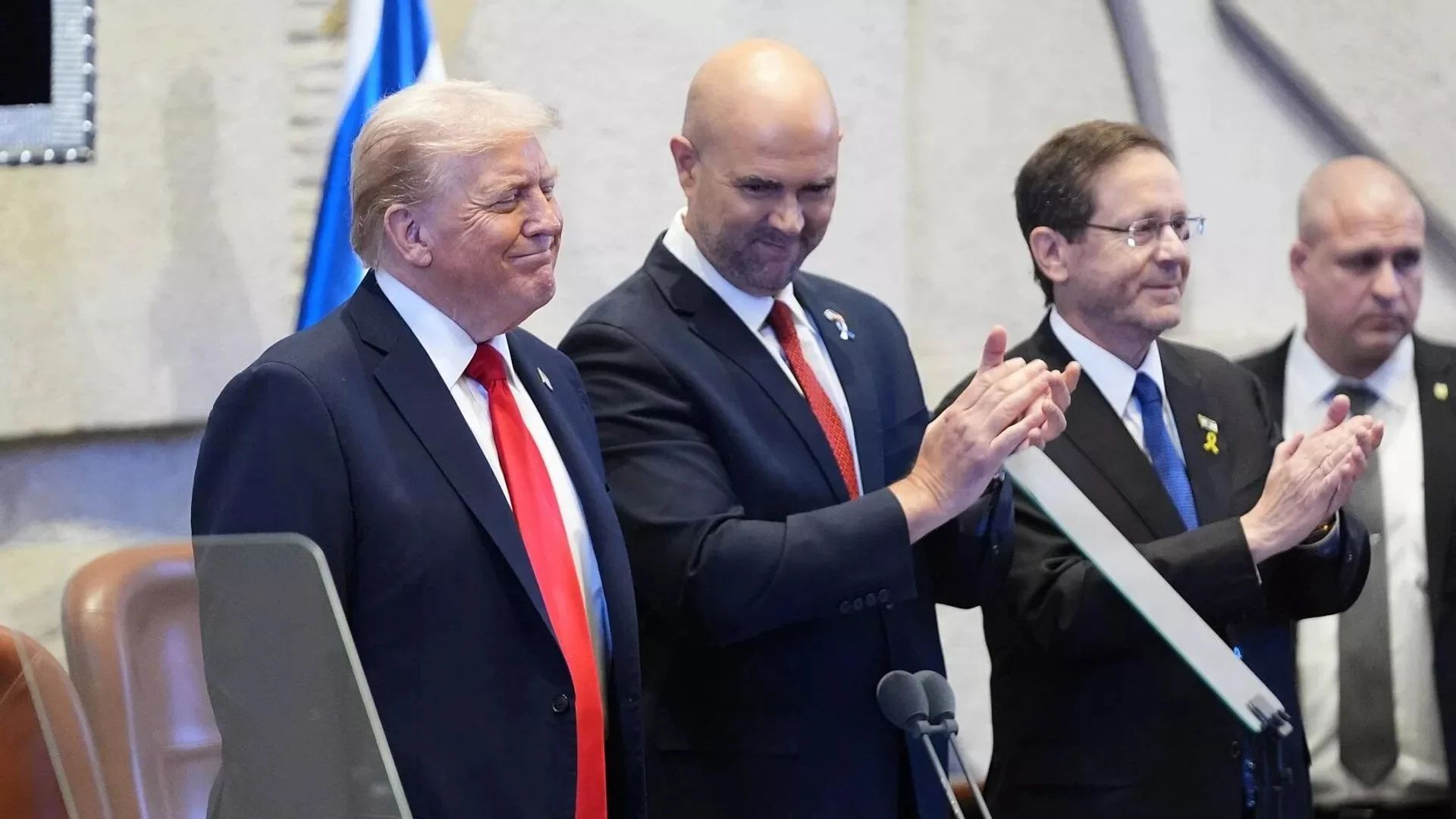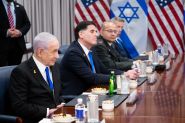- Home
- Middle East
- Trump in Israel: 'The Historic Dawn of a New Middle East'

Ovation at the Knesset: Trump promises “peace for Israel and its neighbors.” ©Al-Markazia
“The historic dawn of a new Middle East and the end of the era of terrorism.” These words could summarize the speech delivered on Monday afternoon by US President Donald Trump at the Knesset, the Israeli Parliament. Described by observers as “historic,” this address provided an opportunity for the US president to call on Israel and the nations of the region to turn the page on conflicts and consolidate peace following the end of the war in Gaza.
Amid trumpets and the ovations of the members of parliament, Trump entered the chamber, decorated in Israeli and American colors. In the galleries, many spectators wore red caps bearing the inscription “Trump, the President of Peace.”
Upon his arrival, the US president warmly greeted Prime Minister Benjamin Netanyahu, declaring with a smile, “He’s not an easy guy to deal with, but that’s what makes him exceptional. Bravo Bibi, well done,” before noting that joint efforts had brought 20 Israeli hostages back to their families after two years of captivity, marking, in his view, “the historic dawn of a new Middle East.”
Trump presented the ceasefire in Gaza as “an incredible triumph for Israel and the world,” stating that “the forces of chaos that have plagued the region are completely defeated” and that “the long and painful nightmare is finally over for Israelis and Palestinians.” He also mentioned Iran, arguing that if the regime had possessed nuclear weapons, it “would not have allowed the Arab nations to reach the agreement we have today.”
Despite historical tensions, he emphasized the possibility of future cooperation, saying that “even with Iran, whose regime has caused so many deaths in the Middle East, the hand of friendship and cooperation remains extended,” while noting that he first wanted to “close the chapter with Russia” before engaging in new negotiations.
The US president praised Israel’s achievements over recent years, stating, “Israel, with our help, has won everything it could by the strength of arms.” He also recalled the Hamas disarmament plan, endorsed by the regional community. Additionally, he announced that his administration supports the Lebanese government in disarming Hezbollah and building a country “that lives in peace with its neighbors.”
Addressing Arab and Muslim nations, the US president encouraged adherence to the Abraham Accords and thanked the countries that contributed to the secure reconstruction of Gaza. “This is an opportunity for the Palestinians to definitively turn away from the path of violence,” he asserted.
Donald Trump’s speech was briefly interrupted when parliamentarians attempted to raise signs in support of recognizing the State of Palestine. These left-wing members, including Ayman Odeh, denounced the hypocrisy of the event, reminding that “only the end of the occupation and recognition of the State of Palestine alongside Israel will bring justice, peace and security for all.”
Despite this interruption, the address allowed Trump to consolidate his role as a regional mediator and highlight the possibility of a peaceful Middle East based on cooperation between Israel, its neighbors and the international community.
Netanyahu: The Israeli Victory Proclaimed
Before the US president’s speech, Israeli Prime Minister Benjamin Netanyahu addressed the Knesset. Speaking to the members in polished English, after an introduction in Hebrew, he paid tribute to Donald Trump for his support of Israel over the years. According to him, “no US president has ever done so much for Israel,” citing notably the transfer of the US embassy to Jerusalem in 2018, the signing of the Abraham Accords and Washington’s recognition of Israel’s sovereignty over the occupied Syrian Golan Heights.
Netanyahu also highlighted Trump’s crucial role in the ceasefire agreement between Israel and Hamas, a process that, in his view, enjoyed the support of a large part of the international community. The Prime Minister hailed this initiative as “a proposal that brings all our hostages home, ends the war while achieving all our objectives, and paves the way for a historic expansion of peace in our region and beyond.” He emphasized, speaking directly to Trump, that he shares the same commitment to peace, insisting on the deep desire of the Israeli people to turn the page on conflicts.
Without mentioning specific countries, Netanyahu criticized certain governments that, in his view, succumbed to “Hamas propaganda” and the pressures of antisemitic crowds in their own countries. He asserted that these governments had called on Israel to immediately halt hostilities without demanding the disarmament of Hamas or the demilitarization of Gaza.
At the conclusion of his speech, the Israeli Prime Minister once again thanked Donald Trump. The two men shared a warm embrace and exchanged a few words as a sign of political camaraderie. Then, quoting a famous passage from the Book of Ecclesiastes, Netanyahu concluded, “There is a time for peace, and a time for war,” thereby signaling the start of a new phase of reconciliation and stability. “No one wants peace more than the people of Israel,” he added, highlighting the nation’s aspiration to consolidate the gains of this ceasefire.
‘Peace in the Middle East Is Not Just a Hope’
Ahead of his speech, the US president told journalists gathered at the Knesset, “Peace in the Middle East is not just a hope, it can become a reality. This is the historic dawn of a new Middle East. The United States will not forget the cruelty of the events of October 7.”
He hailed an “incredible victory for Israel and the world,” urging the Jewish state to “move toward peace” and calling on Iran to “abandon the hateful rhetoric that has led to misery and failure.”
Trump also emphasized the need to “restore stability in Gaza and offer a better life to its inhabitants,” denouncing “decades of terrorism and extremism that have had tragic consequences, from Gaza to Iran.”
In this context, he stated that “Hamas will comply with the disarmament plan” and answered “yes” when asked if the war was over.
Earlier on Monday morning, shortly after arriving in Tel Aviv aboard Air Force One, President Trump met privately with Netanyahu before meeting several families of recently released Israeli hostages. Twenty living hostages had indeed been released by Hamas as part of the implementation of the Washington-sponsored peace agreement.
The US president’s visit also took an unexpected diplomatic turn. During the drive from Ben Gurion Airport to the Knesset, Trump reportedly convinced Netanyahu to attend the Sharm el-Sheikh summit, even though he had not been invited. In the presidential limousine, the US president is said to have urged his Egyptian counterpart, Abdel Fattah el-Sissi, to invite the Israeli prime minister. Shortly thereafter, Sissi officially contacted Netanyahu to extend an invitation to the summit, which is also to be attended by Palestinian President Mahmoud Abbas.
However, while the Egyptian presidency confirmed this participation and several media outlets presented it as a given, the Israeli prime minister’s office ultimately announced that Benjamin Netanyahu would not attend the Gaza summit, citing its coincidence with the beginning of the Jewish holiday of Sukkot.
Read more



Comments